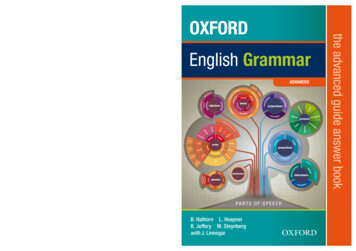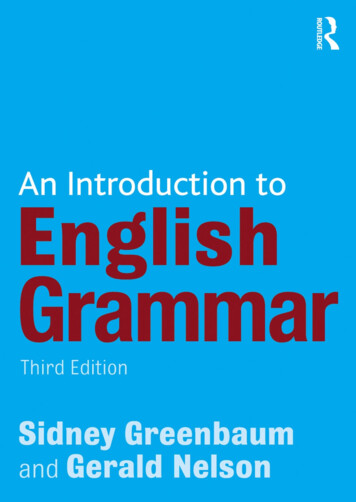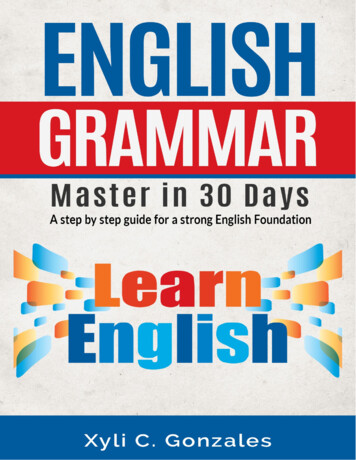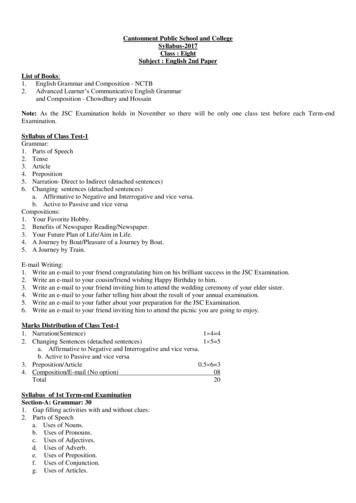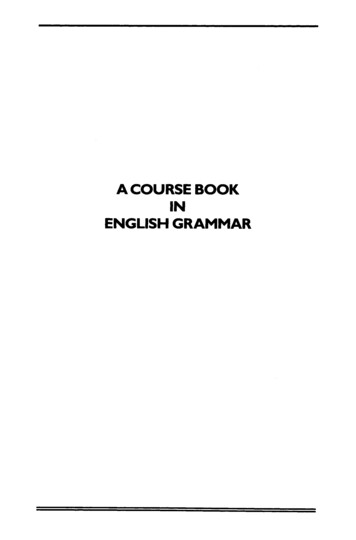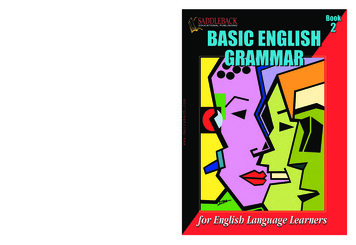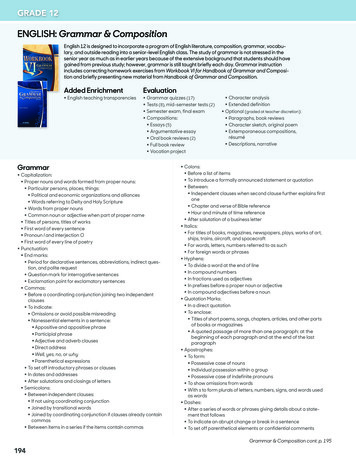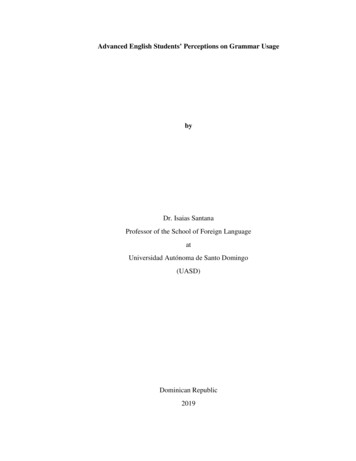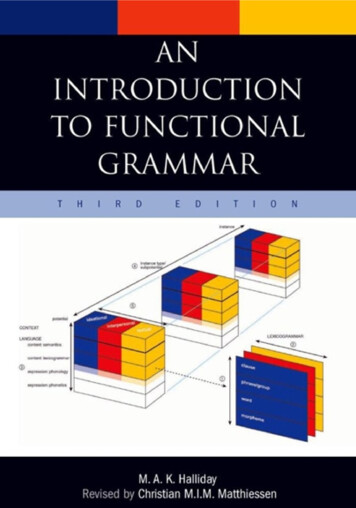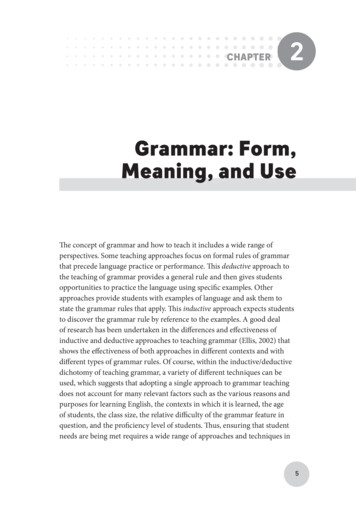
Transcription
NOTICE OF RIGHTSAll rights reserved. No part of this publication may bereproduced, stored in a retrieval system, or transmitted inany form, electronic or by any other means,photocopying, recording or otherwise, without priorwritten consent from the author.Copyright 2019 Jacqueline Melvin
IntroductionIf you are looking for a book with a difference then this isthe book for you.Advanced English grammar and vocabulary quiz bookhas been devised for EFL students who have reachedupper intermediate to advanced level of English.The first part of the book is designed to test yourknowledge on multiple meaning words and words thatcause confusion.Grammar structures are also included in quiz form andclear explanations can be found in the answer key thatfollows each exercise.What’s more, there is also a ‘test yourself onprepositions’ section as well as exercises on connectors.Modal auxiliary verbs are also dealt with along with otherimportant grammar points. A phrasal verbs quizcompletes the book.
Table of contentsINTRODUCTIONMULTIPLE MEANING WORDS EXERCISE ONEMULTIPLE MEANING WORDS EXERCISE TWOMULTIPLE MEANING WORDS EXERCISE THREEMULTIPLE MEANING WORDS EXERCISE FOUREXERCISE ONE-ANSWERSEXERCISE TWO-ANSWERSEXERCISE THREE-ANSWERSEXERCISE FOUR-ANSWERSCONFUSING WORDS EXERCISE ONECONFUSING WORDS EXERCISE ONE-ANSWERSCONFUSING WORDS EXERCISE TWO
CONFUSING WORDS EXERCISE TWO-ANSWERSCONFUSING WORDS EXERCISE THREECONFUSING WORDS EXERCISE THREE-ANSWERSCONFUSING WORDS EXERCISE FOURCONFUSING WORDS EXERCISE FOUR-ANSWERSCONFUSING WORDS-EXERCISE FIVEEXERCISE FIVE-ANSWERSCONFUSING WORDS-EXERCISE SIXEXERCISE SIX-ANSWERSCONFUSING WORDS-EXERCISE SEVENCONFUSING WORDS-EXERCISE SEVEN-ANSWERSCONFUSING WORDS-EXERCISE EIGHTCONFUSING WORDS-EXERCISE EIGHT-ANSWERSCONFUSING WORDS-EXERCISE NINE
CONFUSING WORDS-EXERCISE NINEGRAMMAR TEST ONEINDEFINITE PRONOUNSGRAMMAR TEST ONE-ANSWERSGRAMMAR TEST TWOSINGULAR OR PLURALGRAMMAR TEST TWO ANSWERSGRAMMAR TEST THREECOLLOCATIONS ONEGRAMMAR TEST THREE-ANSWERSGRAMMAR TEST FOURVERB COLLOCATIONS TWOGRAMMAR TEST FOUR-ANSWERSGRAMMAR TEST FIVE
VERB COLLOCATIONS THREEGRAMMAR TEST FIVE-ANSWERSGRAMMAR TEST SIXCOLLOCATIONS FOURGRAMMAR TEST SIX-ANSWERSGRAMMAR TEST SEVENVERB COLLOCATIONS FIVEGRAMMAR TEST SEVEN-ANSWERSGRAMMAR TEST EIGHTCOLLOCATIONS SIXGRAMMAR TEST EIGHT-ANSWERSGRAMMAR TEST NINECOLLOCATIONS SEVENGRAMMAR TEST NINE-ANSWERS
GRAMMAR TEST TENCOLLOCATIONS EIGHTGRAMMAR TEST TEN-ANSWERSGRAMMAR TEST ELEVENMODAL AUXILIARY VERBS SEMI MODALSGRAMMAR TEST ELEVEN-ANSWERSGRAMMAR TEST TWELVEMODAL AUXILIARY VERBS-PRESENT AND PAST ONEGRAMMAR TEST TWELVE-ANSWERSGRAMMAR TEST THIRTEENMODAL AUXILIARY VERBS-PRESENT AND PAST TWOGRAMMAR TEST THIRTEEN-ANSWERSGRAMMAR TEST FOURTEENWILL FOR DEDUCTION AND/OR PREDICTION
GRAMMAR TEST FOURTEEN-ANSWERSGRAMMAR TEST FIFTEENCONDITIONALSGRAMMAR TEST FIFTEEN-ANSWERSGRAMMAR TEST SIXTEENPASSIVE STRUCTURES ONEGRAMMAR TEST SIXTEEN-ANSWERSGRAMMAR TEST SEVENTEENPASSIVE STRUCTURES TWOGRAMMAR TEST SEVENTEEN-ANSWERSGRAMMAR TEST EIGHTEENPAST TENSES ONEGRAMMAR TEST EIGHTEEN-ANSWERSPAST TENSES ONE
GRAMMAR TEST NINETEENPAST TENSES TWOGRAMMAR TEST NINETEEN-ANSWERSPAST TENSES TWOGRAMMAR TEST TWENTYPERFECTIVE ASPECTGRAMMAR TEST TWENTY-ANSWERSGRAMMAR TEST TWENTY ONEREPORTED SPEECHGRAMMAR TEST TWENTY ONE-ANSWERSGRAMMAR TEST TWENTY TWOFUTURE ASPECTGRAMMAR TEST TWENTY TWO-ANSWERSGRAMMAR TEST TWENTY THREE
CONNECTORS/CONJUNCTIONS ONEGRAMMAR TEST TWENTY THREE-ANSWERSGRAMMAR TEST TWENTY FOURCONNECTORS/CONJUNCTIONS TWOGRAMMAR TEST TWENTY FOUR-ANSWERSGRAMMAR TEST TWENTY FIVEPREPOSITIONS ONEGRAMMAR TEST TWENTY FIVE-ANSWERSGRAMMAR TEST TWENTY SIXPREPOSITIONS TWOGRAMMAR TEST TWENTY SIX-ANSWERSGRAMMAR TEST TWENTY SEVENPREPOSITIONS THREEGRAMMAR TEST TWENTY SEVEN-ANSWERS
GRAMMAR TEST TWENTY EIGHTPREPOSITIONS FOURGRAMMAR TEST TWENTY EIGHT-ANSWERSGRAMMAR TEST TWENTY NINEPREPOSITIONS FIVEGRAMMAR TEST TWENTY NINE-ANSWERSTEST THIRTY-PHRASAL VERBSPHRASAL VERBSTEST THIRTY-ANSWERS
Multiple meaning words exercise oneThere is one word only that fits the gaps in the followingsentences 1-12. Which word is it?1. We haven’t found a flat although we’ve beenlooking for weeks.2. Would you like or sparkling water with yourmeal?3. Can you stay while I cut your fringe? If youkeep moving I won’t be able to cut it straight.4. “ life” is a genre of painting where life literallystands in arranged displays of objects.
life5. Does John live in Manchester or has he moved?6. Even though she works very hard, she finds thetime to help others.7. He woke up suddenly when he heard a noise in theof the night.8. “ waters run deep” is an idiomatic expressionwhich basically means – sometimes quiet people who donot say much have the deepest thoughts and turn out to bemuch more interesting than people who make a lot ofnoise, that is, the ones who talk non-stop.
9. Even though I sleep nine hours a night, I’m tiredin the morning.10. My job is not very well paid but I love it all thesame.11. I remember that old house we used to live in aschildren.12. Her son is eight years old and he can’t read orwrite.
Multiple meaning words exercise twoThere is one word only that fits the gaps in the followingsentences 1-20. Which word is it?1. I’m not sure what I want to study when I go touniversity. I haven’t made up my yet.2. I hope you don’t if I open the window. It’s a bithot in here.3. Can you my seat while I go to the bar?4. “Where’s John?” “He’s lying on the floor out of hisafter drinking a bottle of whiskey.”5. “Mens sana in corpore sano”, is a Latin phrase, whichmeans, “a healthy in a healthy body”.6. It’s all in your is an idiom that means thatsomething is a figment of your imagination.7. Uri Geller was famous because he had the ability tobend metal objects with his .8. Sorry I didn’t phone you but it completely slipped my.9. I’ve got so much on my these days that *Idon’t know if I am coming or going.*In English, the phrase “I don’t know if I’m coming orgoing”, means that you have no idea what you are doing.
going”, means that you have no idea what you are doing.10. She’s got her set on getting that job. I hope shegets it otherwise it will be a huge disappointment.11.” over matter” is an English phrase whichmeans that you can use your mental ability to influenceyour reality. Another saying with the same meaning is,“where there is a will, there is a way.”12. Jane is a very indecisive person. She’s alwayschanging her about everything.13. “ your language” means “be careful how youspeak”. A phrase with the same meaning is, “watch yourtongue”.14. If you have travelled on the London underground,you will have read the notice telling passengers to “the gap” when getting on or off the subway. This isbasically a warning that means you need to be careful notfall down into the space between the train and theplatform.15. Little Johnny always fails his exams. This is mainlybecause he lets his wander. He’s got noconcentration whatsoever.16. My nosey neighbour is always gossiping abouteveryone. I wish she would just her own businessinstead of sticking her nose in everybody else’s lives.
17. “Would you like tea or coffee?” “I don’t . I’llhave whatever you are having”.18. Since my husband retired, he’s been bored out of his. He is not used to having so much free time.19. She always speaks her . She doesn’t mince herwords. She really should count to ten before she opensher mouth as one day it’s going to get her into trouble.20. I can’t stop thinking about my ex husband. I’m goingto have to try to get him out of my . It’s not easythough after thirty years of marriage.
Multiple meaning words exercise threeThere is one word only that fits the gaps in the followingsentences 1-10. Which word is it? Where the word is averb, you may have to use the past tense.1. Excuse me! What does this word ?2. He’s a man. He never spends any money.3. I say what I and I what I say.4. I’m so sorry. I didn’t to hurt you. Please forgiveme.5. I to buy bread on the way home from work but Icompletely forgot.6. Jane hasn’t arrived yet. She was to be here halfan hour ago. I wonder where she can be.7. You’re to switch off your mobile phones andmodems before going to bed. It isn’t good for you toleave them on during the night.8. “I don’t think we are to be together,” saidSandra to her boyfriend. “We are *as different as chalkand cheese.”*As different as chalk and cheese to be completelydifferent in every way.9. “What are you doing here,” said Mrs Redford to her
9. “What are you doing here,” said Mrs Redford to herson as she entered the house. “You’re to be atschool.”10. The old saying “what’s to be, will be,”basically means that there is no escape from destiny.
Multiple meaning words exercise fourThere is one word only that fits the gaps in the followingsentences 1-20. Which word is it?1. “Okay, taken,” he said. (This has the samemeaning as “okay, I understand/I get it.)2. “Don’t at people,” said Mrs Harris to her son.“It’s very rude.”3. At the end of a company meeting: “Let’s just go overthe main before we *call it a day,” said themanager.4. We have upgraded our software to version fourfive (4.5).5. The has broken off my pencil. Do you happen tohave a sharpener so I can sharpen it?6. Can’t you just get to the instead of beating aboutthe bush.7. What you are saying is completely irrelevant to thediscussion at hand. It’s beside the .8. Well if you want my of view, I think you shouldscrap the idea.9. Ladislao José Biro invented the ball pen – alsoknown as the ‘biro’ which entered production in 1944.
known as the ‘biro’ which entered production in 1944.10. I’m going to have to make a of getting upearlier in the morning. I always get up at the last momentand end up not having the time have breakfast before Ileave for work.11. An old proverb tells us that there is no incrying over spilt milk. What’s done is done and there’snothing we can do to change the situation.12. I’ve reached breaking in my job. If I don’tleave it I will soon lose my mind.13. The detectives needed some fresh leads tothem in the right direction.14. History was never my strong when I was atschool.15. That was a really valid you made at today’smeeting. We’ll take it into consideration.16. The twelve character has become the defaultsize in digital word processing.17. When her husband, whom she loved dearly, left her,she was at a very vulnerable in her life.18. “Gene” means “a segment of DNA”, located at aparticular on a chromosome. This is whatdetermines hereditary characteristics.19. One of the several meanings of “singularity” is a
19. One of the several meanings of “singularity” is awhere all parallel lines meet.20. The bank robbers held a member of staff atgun .
Exercise one-answers1. We still haven’t found a flat although we’ve been looking for weeks.2. Would you like still or sparkling water with your meal?3. Can you stay still while I cut your fringe? If you keep moving I won’t be ableto cut it straight.4. “ Still life” is a genre of painting where life literally stands still in arrangeddisplays of objects.5. Does John still live in Manchester or has he moved?6. Even though she works very hard, she still finds the time to help others.7. He woke up suddenly when he heard a noise in the still of the night.8. “ Still waters run deep” is an idiomatic expression which basically means –sometimes quiet people who do not say much have the deepest thoughts and turnout to be much more interesting than people who make a lot of noise, that is, theones who talk non-stop.9. Even though I sleep nine hours a night, I’m still tired in the morning.10. My job is not very well paid *but still I love it all the same.11. I still remember that old house we used to live in as children.12. Her son is eight years old and he still can’t read or write.‘Still’ used as an adjective means that something or someone is motionless/notmoving.‘Still’ as an adverb places the emphasis on continuity.
Exercise two-answers1. I’m not sure what I want to study when I go to university. I haven’t made upmy mind yet. (Make up one’s mind decide)2. I hope you don’t mind if I open the window. It’s a bit hot in here.3. Can you mind my seat while I go to the bar? (Can you mind my seat canyou look after it, keep your eye on it for a period of time)4. “Where’s John?” “He’s lying on the floor out of his mind after drinking abottle of whiskey.” (To be out of your mind to be on another planet either dueto too much alcohol consumption or drugs. It can also mean ‘to be crazy’)5. “Mens sana in corpore sano”, is a Latin phrase, which means, “a healthymind in a healthy body”.6. It’s all in your mind is an idiom that means that something is a figment of yourimagination.7. Uri Geller was famous because he had the ability to bend metal objects withhis mind .8. Sorry I didn’t phone you but it completely slipped my mind . (If somethingslips your mind it means you forget about it)9. I’ve got so much on my mind these days that *I don’t know if I am coming orgoing. (To have something on your mind your thoughts are preoccupied withsomething)*In English, the phrase “I don’t know if I’m coming or going”, means that youhave no idea what you are doing.10. She’s got her mind set on getting that job. I hope she gets it otherwise it willbe a huge disappointment. (To have one’s mind set on something 11. “ Mind over matter” is an English phrase which means that you can useyour mental ability to influence your reality. Another saying with the samemeaning is, “where there is a will, there is a way.”12. Jane is a very indecisive person. She’s always changing her mind abouteverything. (To change one’s mind to decide not to do something13. “ Mind your language” means “be careful how you speak”. A phrase withthe same meaning is, “watch your tongue”.
14. If you have travelled on the London underground, you will have read thenotice telling passengers to “ mind the gap” when getting on or off the subway.This is basically a warning that means you need to be careful not fall down intothe space between the train and the platform.15. Little Johnny always fails his exams. This is mainly because he lets his mindwander. He’s got no concentration whatsoever.16. My nosey neighbour is always gossiping about everyone. I wish she wouldjust mind her own business instead of sticking her nose in everybody else’s lives.17. “Would you like tea or coffee?” “I don’t mind . I’ll have whatever you arehaving”.18. Since my husband retired, he’s been bored out of his mind . He is not used tohaving so much free time. (To be bored out of one’s mind to be so bored thatyou feel you could become crazy)19. She always speaks her mind . She doesn’t mince her words. She really shouldcount to ten before she opens her mouth as one day it’s going to get her intotrouble.20. I can’t stop thinking about my ex husband. I’m going to have to try to gethim out of my mind . It’s not easy though after thirty years of marriage. (To getsomeone or something out of your mind to try to forget)
Exercise three-answers1. Excuse me! What does this word mean ?2. He’s a mean man. He never spends any money. (The adjective ‘mean’ theopposite of generous)3. I say what I mean and I mean what I say. (This I say what I seriously thinkand I am serious about what I am saying)4. I’m so sorry. I didn’t mean to hurt you. Please forgive me. (To not meansomething to not do something intentionally)The following examples are the past tense of the verb used in numbers one andthree.5. I meant to buy bread on the way home from work but I completely forgot. (Itwas my plan to buy bread but I forgot)6. Jane hasn’t arrived yet. She was meant to be here half an hour ago. I wonderwhere she can be. (She was meant to be here she was supposed to be here/itwas expected of her to be here/meant infinitive)7. You’re meant to switch off your mobile phones and modems before going tobed. It isn’t good for you to keep them on during the night. (This has a similarmeaning to ‘you should’ in the sense of, it’s a good idea, it’s a sensible thing todo)8. “I don’t think we are meant to be together,” said Sandra to her boyfriend.“We are *as different as chalk and cheese.”*As different as chalk and cheese to be completely different in every way.9. “What are you doing here,” said Mrs Redford to her son as she entered thehouse. “You’re meant to be at school.” (The same meaning as number 6)10. The old saying “what’s meant to be, will be,” basically means that there isno escape from destiny.
Exercise four-answers1. “Okay, point taken,” he said. This has the same meaning as “okay, Iunderstand/I get it.”2. “Don’t point at people,” said Mrs Harris to her son. “It’s very rude.” (Toindicate with your finger)3. At the end of a company meeting: “Let’s just go over the main points beforewe *call it a day,” said the manager.*To call it a day to stop working for the day.4. We have upgraded our software to version four point five (4.5).5. The point has broken off my pencil. Do you happen to have a sharpener so Ican sharpen it?6. Can’t you just get to the point instead of *beating about the bush.*‘Get to the point’ has the same meaning as ‘don’t beat about/around the bush.’7. What you are saying is completely irrelevant to the discussion at hand. It’sbeside the point .8. Well if you want my point of view, I think you should *scrap the idea. (Mypoint of view my opinion)*To scrap an idea to not continue with it/forget about it/discard of it.9. Ladislao José Biro invented the ball point pen – also known as the ‘biro’which entered production in 1944.10. I’m going to have to make a point of getting up earlier in the morning. Ialways get up at the last moment and end up not having the time have breakfastbefore I leave for work. (Make a point of doing something make an effort)11. An old proverb tells us that there is no point in crying over spilt milk. What’sdone is done and there’s nothing we can do to change the situation. (‘There is nopoint in doing something it is a waste of time)12. I’ve reached breaking point in my job. If I don’t leave it I will soon lose mymind. (‘To reach breaking point’ when you can’t take anymore of something)13. The detectives needed some fresh leads to point them in the right direction.(To point them to indicate them)
14. History was never my strong point when I was at school.15. That was a really valid point you made at today’s meeting. We’ll take it intoconsideration.16. The twelve point character has become the default size in digital wordprocessing.17. When her husband, whom she loved dearly, left her, she was at a veryvulnerable point in her life.18. “Gene” means “a segment of DNA”, located at a particular point on achromosome. This is what determines hereditary characteristics.19. One of the several meanings of “singularity” is a point where all parallellines meet.20. The bank robbers held a member of staff at gun point .
Confusing words exercise oneChoose the correct word in the exercise that follows. Theanswer and explanations can be accessed in the answersection.1. Actually vs. currently1. We are hiring new managers who have a visionfor the future.2. “That boy who was with Janet yesterday looked reallylike her.” “Well, he’s her twin brother. That’swhy. Didn’t you know?”3. “Are you doing anything on Saturday night?” “Well, I was thinking of going to the cinema.”4. We are relocating our distribution centre fromEngland to India. The move is expected to save thousandson labour costs.5. “I don’t really like Alan. He’s so standoffish.” “He’sa really decent guy once you get to know him.”2. Advice vs. advise1. My dentist me to get my wisdom teethextracted.2. If you want my , I think you should accept thejob. It would be a great opportunity for you.
job. It would be a great opportunity for you.3. An old saying tells us not to give anyone unlessthe person asks for it.3. Affect vs. effect1. Working 18 hours a day has seriously myhealth.2. Physical activity has a protective againstcardiovascular disease.3. Most medicines have side .4. Our thoughts, feelings and behaviour can ourhealth.5. Our thoughts, feelings and behaviour can have anon our health.4. Affective vs. effective1. The treatment was not so I will have to trysomething else.2. Bipolar, also known as clinical depression, is andisorder.3. Chocolate is known to be an mood up-lifter.4. If you want to produce an essay, you must firstof all pick a topic you want to write about and thenoutline your thoughts in a logical sequence of events.
outline your thoughts in a logical sequence of events.5. All ready vs. already1. I’ve seen that film .2. “Are you to go?” “Yes we are.”3. She’s done her homework so she can go outwith her friends.6. All together vs. altogether1. Let’s sing .2. this year I have earned 30,000 between myfull time job and my part time one.7. All ways vs. always1. We tried possible but nothing seems to work.2. I get up late on Sundays.3. Dogs are superior to man in .4. The customer care service is here to assist you inpossible.5. I’m late for work. It won’t be long until I’msacked if I don’t start getting up earlier.8. Any body vs. anybody1. Our jeans have been tailored to fit , be it fat, thin,
tall or short.2. Is there in the bathroom? The light’s on butnobody answers when I knock on the door.3. that is found undergoes forensic testing.9. Any more vs. anymore1. I’ve become a vegetarian so I don’t eat meat .2. I don’t buy clothes because I don’t needclothes. I’ve got enough clothes to last me three lifetimes.10. Any time vs. anytime1. You can visit me you want.2. These days I am so busy that I don’t have toiron my clothes.
Confusing words exercise one-answers1. Actually vs. currently1. We are currently hiring new managers who have a vision for the future.2. “That boy who was with Janet yesterday looked really like her.” “Wellactually , he’s her twin brother. That’s why. Didn’t you know?”3. “Are you doing anything on Saturday night?” “Well actually , I was thinkingof going to the cinema.”4. We are currently relocating our distribution centre from England to India.The move is expected to save thousands on labour costs.5. “I don’t really like Alan. He’s so standoffish.” “He’s actually a really decentguy once you get to know him.”NoteActually to be honest/to tell you the truthCurrently in this period of time2. Advice vs. advise1. Please advise us as soon as possible should you wish to cancel yourappointment.2. If you want my advice , I think you should accept the job. It would be a greatopportunity for you.3. An old saying tells us not to give anyone advice unless the person asks for it.4. The doctor advised me to take plenty of rest.NoteAdvice the nounAdvise the verb3. Affect vs. effect
1. Working 18 hours a day has seriously affected my health.2. Physical activity has a protective effect against cardiovascular disease.(Outcome)3. Most medicines have side effects .4. Our thoughts, feelings and behaviour can affect our health.5. Our thoughts, feelings and behaviour can have an effect on our health.NoteAlthough "affect" and "effect" are both nouns and verbs, "affect" is used ineveryday speech mainly as a verb while "effect" is used mainly as a noun."Affect" to influence"Effect" to be the outcome4. Affective vs. effective1. The treatment was not effective . I will have to try something else.2. Bipolar, which is also known as clinical depression, is an affective disorder.3. Chocolate is known to be an effective mood up-lifter.4. If you want to produce an effective essay, you must first of all pick a topic youwant to write about and then outline your thoughts in a logical order.These are the adjectives which derive from the nouns and verbs " affect " and "effect ".5. All ready vs. already1. I’ve seen that film already .2. “Are you all ready to go?” “Yes we are.”3. She’s already done her homework so she can go out with her friends if shewants, said Maggie’s mother to Maggie’s father.Note"All ready" completely ready/prepared. "All" gives emphasis to the adjective"ready"."Already" an adverb which means prior to now or prior to a specified time. It
"Already" an adverb which means prior to now or prior to a specified time. Itcan also denote surprise at something occurring earlier than expected. E.g. “Areyou going already? I thought you were going to stay for dinner.”6. All together vs. altogether1. Let’s sing all together .2. Altogether this year I have earned 30,000 between my full time job and mypart time one.Note"All together" everyone at the same time"Altogether" in total7. All ways vs. always1. We tried 1 all ways possible but nothing seems to work. (Every method)2. I always get up late on Sundays.3. Dogs are superior to man in 2 all ways . (In every aspect)4. The customer care service is here to assist you in 2 all ways possible.5. I’m always late for work. It won’t be long until I’m sacked if I don’t startgetting up earlier.Note"All ways" 1 every method/ 2 in every aspect"Always" adverb of frequency 100% of the time. It also means "forever".E.g. “I will always love you.” (I will love you forever)8. Any body vs. anybody1. Our jeans have been tailored to fit any body , be it fat, thin, tall or short.2. Is there anybody in the bathroom? The light’s on but nobody answers when Iknock on the door.3. Any body that is found undergoes forensic testing.Note
NoteWhen written as two words, "any" is an undefined pronoun/unspecific whichrefers to an undefined/non specific number or amount. "Any" modifies the nounwhich follows it. It singularizes all physical bodies at random. It means or bodyA or body B or body C or body D etc."Anybody" as one word is used in questions and negatives and is synonymouswith ‘anyone’ and indicates an undefined/non specific random person, or personA, B, C, D etc.9. Any more vs. anymore1. I’ve become a vegetarian so I don’t eat meat anymore .2. I don’t buy clothes 1 anymore because I don’t need 2 any more clothes. I’vegot enough clothes to last me three life times.Note"Anymore" as one word is a temporal adverb. Temporal adverbs modify time."Anymore" has the same meaning as "no longer". It is used with a negative andrefers to something in the past that doesn’t exist now. In example number 1, theadverb "anymore" modifies the verb ‘eat’. I ate meat in the past but now I don’t.Example number 2.1, is the same as example 1 and means that in the past Ibought clothes but now I don’t.Example 2.2. When "any more" is used as two words, "any" is a modifier of"more," and "more" is a reference to something else that follows consisting of anoun or a noun phrase. "Any" determines an indefinite amount/ a non definedquantity of something when used without "more". When used with "more" Itrefers to an additional undefined quantity of something.Would you like any tea? (An undefined quantity of tea)Would you like any more tea? (An additional undefined quantity of tea)10. Any time vs. anytime1. You can visit me anytime you want.2. These days I am so busy that I don’t have any time to iron my clothes.Note
"Any time" written as two words "any" as an undetermined pronoun thenoun "time". It refers to an undefined quantity of time in the question and in thenegative it refers to "no time". E.g. I don’t have any time to iron my clothes Ihave no time to iron my clothes."Anytime" written as one word a non defined random time.
Confusing words exercise two1. Any way vs. anyway1. If I can help you in I will.2. My mum didn’t want me to study law but I studied it.3. There is no evidence to suggest that a person with anIQ of 170 is in more likely to achieve a greaterimpact in their field than a person with an IQ of 130.4. “Is there to tell when eggs have *gone off?”“Yes, put them in a basinful of cold water and if theyfloat to the top they’re still fresh. If they sink to thebottom, they’ve gone off.”*To go off to no longer be fresh for consumption.5. “I’m sorry I can’t help you.” “Don’t worry. Thanks.6. What way should I go to get to the railway station?You can go from here. All the roads lead to thestation.2. Beside vs. besides1. What do you do in your free time playingtennis?2. Where is the cat? It’s over there the door.
2. Where is the cat? It’s over there the door.3. Compared to vs. compared with1. Sales fell 1.2% compared last year.2. He compared the colour of her lips a red rose.4. Compliment vs. complement1. The colour green really your eyes. You shouldwear green more often.2. John and Mary really each other. She’s quite alively person whereas he’s really quiet and laid-back.3. My boss me on how well I managed the project.4. My brother’s friend is always paying me . Lastnight he told me that my hair was beautiful.5. Composed of vs. composed by vs. comprise1. The company is highly trained, experiencedpeople.2. A Minuet and Trio in G major was Mozart whenhe was just five years old. It was his first documentedcomposition.3. Atoms are three main parts: protons, neutronsand electrons.4. The cardiovascular system the heart and the
4. The cardiovascular system the heart and thevascular network.5 That which parts, is in need of its parts in orderto exist.6. Scotland approximately 5 million people.6. Consist of vs. consist in1. The only true wisdom knowing that you knownothing. - Socrates2. Our new team six
Advanced English grammar and vocabulary quiz book has been devised for EFL students who have reached upper intermediate to advanced level of English. The first part of the book is designed to test your knowledge on multiple meaning words and words that cause confusion. Grammar structures are also included in quiz form and
